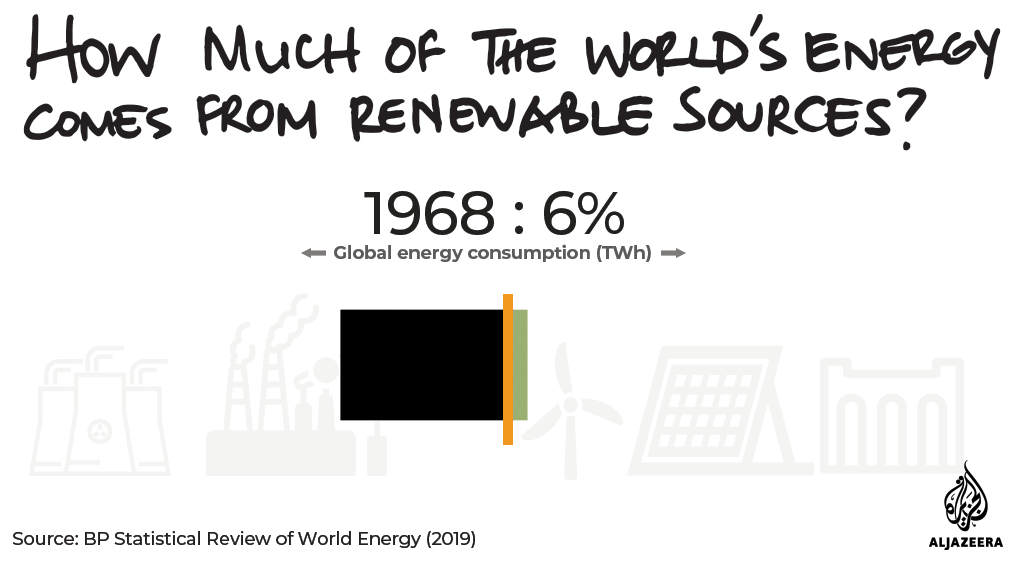The Green Read: Will coronavirus help nature reclaim the Earth?
There are signs of wildlife flourishing in the absence of humans, but COVID-19 has also slowed conservation efforts.

In these times when we need to seek out positives to counter the gloom, there are many good things happening in the natural world. In the space wrought open by COVID-19, a quiet has descended on parts of our planet previously drowned out by normal life thundering on.
It is of small comfort to businesses that rely on the daily whirl to survive but it is happening, so let us drink it in.
Keep reading
list of 4 itemsAre seed-sowing drones the answer to global deforestation?
Rainfall set to help crews battling wildfire near Canada’s Fort McMurray
The Alabama town living and dying in the shadow of chemical plants
In our cities, the thrum of traffic and construction and planes passing overhead has given way to the boisterous dawn chorus. This daily symphony of birdsong is more audible than it has been in decades in urban areas this northern spring.
Even the ocean depths are quieter with fewer ships at sea, and marine biologists are taking this rare opportunity to study the impact the lack of churning, droning propellers will have on ocean life.
Worldwide emissions are down and the air we breathe is cleaner. Wildlife in river and estuary, field and hedgerow and even on the urban fringe, is making hay in the absence of the human hordes and their vehicles.
The flip side
Nature does not have to be asked twice when an opportunity presents itself but this is not always a good thing. Take rodents.
As the Guardian reports from New Zealand, pest control has been deemed a non-essential service by the government; a decision experts say is putting vulnerable wildlife like fledgling birds at risk, as the number of rats, mice and stoats surges.
The pandemic has made the hard work of conservation harder, with projects across the board threatened or put on hold, from tackling invasive species like Himalayan balsam in the United Kingdom to the ongoing efforts to protect the snow leopard in Pakistan.
Which suddenly makes you aware of just how much work it takes to protect what we have left of our biodiversity. And how important it is that this effort is boosted and honed by our current coronavirus experience.
At the end of last year, we talked of the coming decade as being the decade in which the world must about-turn and act decisively. But then a pandemic happened. With critical climate and biodiversity summits postponed, things seemed to have stuttered to a halt.
So it is heartening to know that work is still happening – even on how to reboot economies in a way that does not result in a global spike in emissions, if that is possible.
Green stimulus
This week at the Petersberg Climate Dialogue, held online for the first time, world leaders have been tussling with the difficult debate about the allocation of stimulus funds.
German Chancellor Angela Merkel said: “The coronavirus shows us that international cooperation is crucial and that the well being of one nation always depends on the well being of others … we must not sideline climate but invest in climate technologies.”
The UK government echoed calls from the United Nations saying it was the duty of every responsible leadership to see that economies are revived and rebuilt, by investing in industries and infrastructure that can turn the tide on climate change.
You have to hope these are not just platitudes. One way or another, these are defining moments.
“If governments divert resources tagged for climate change to address the pandemic,” said Niklas Hohne of NewClimate Institute, “economic recovery from COVID-19 will only plunge the world further into the climate crisis.”
Wake up leaders and smell the clean air, you might say.

Your environment round-up
1. UK coal-free: Records have been broken as Britain goes without using coal power for 18 days and counting. Wind and solar energy has helped to fulfil the diminished demand caused by the pandemic. This is the longest coal-free period since 1882 and beats the UK’s previous record set in June 2019.
2. 2020 heatwave: Lockdowns worldwide have lowered emissions, but meteorologists say 2020 is on course to be one of the hottest years since records began. Indeed, the US National Oceanic and Atmospheric Administration has calculated that there is a 75 percent chance that 2020 will be the hottest year since measurements began.
3. US void: In the absence of the US leadership on climate change at the federal level, company employees are stepping to the front, like the thousands of cleaning workers who went on strike.
4. Return of the stork: The first wild stork chicks in centuries are poised to hatch in the UK.
The final word
There is much we do not know, but that is no reason not to trust science on the things we do know. The argument for trust in science is not an argument for blind or blanket trust. It is an argument for warranted confidence against unwarranted scepticism in scientists' findings in their domains of expertise.
